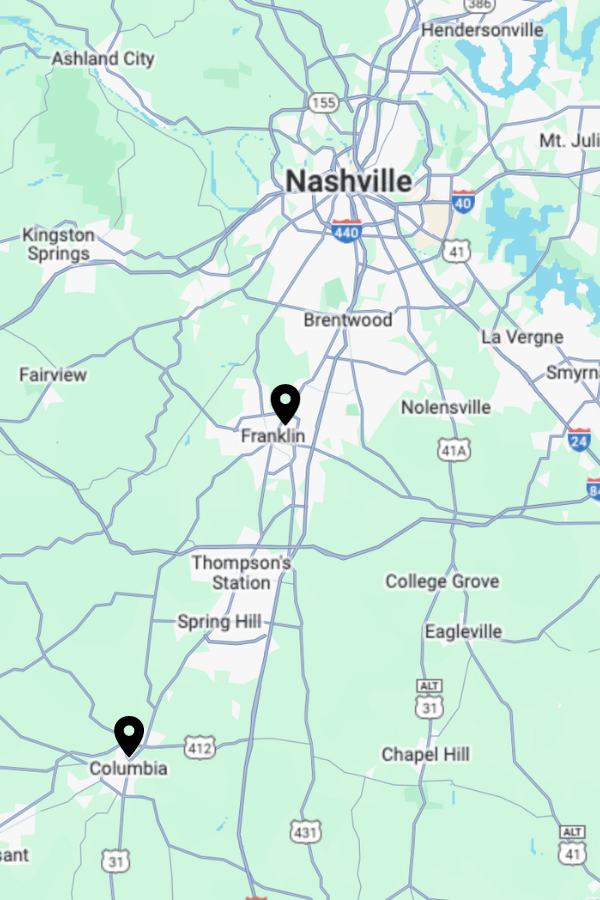Apex Addiction Recovery Center operates several rehabilitation facilities throughout Tennessee, offering inclusive support for people struggling with addiction. With locations strategically placed across the state, Apex Substance Addiction Recovery Center provides accessible and effective treatment options personalized for those seeking recovery.
Apex Recovery Center specializes in heroin addiction treatment, tackling not only substance abuse but also mental health concerns and dual diagnosis cases. Our comprehensive approach integrates heroin addiction therapy, medical support, and personalized care to help patients recover from heroin addiction while addressing underlying mental health conditions, helping clients on a holistic path to healing and heroin addiction recovery.

Learning About Heroin Use Disorder (HUD)
Free Addiction Assessment
Schedule a free, confidential assessment with a licensed clinician. Apex Recovery can check your insurance coverage levels for drug and alcohol addiction, and mental health treatment.
What is a Heroin Addiction Treatment Program?
A heroin addiction treatment program is a structured and comprehensive approach designed to help people overcome their dependence on heroin. These programs typically offer a combination of medical, psychological, and behavioral interventions customized to meet the specific needs of each client.
Treatment may include medication-assisted therapy to manage cravings and withdrawal symptoms, individual and group therapy sessions to address underlying issues and learn coping strategies, and support services to aid in the recovery process. The goal of a heroin addiction treatment program is to assist patients in achieving and maintaining abstinence from heroin while improving their overall quality of life and well-being.
Statistics on Heroin Addiction in Middle Tennessee
In Middle Tennessee, the opioid and heroin crisis has significantly impacted communities, with approximately 70,000 individuals addicted to opioids, including heroin, statewide. Recent years have witnessed a surge in heroin addiction rates across the state, with 2,321 heroin case submissions to TBI Crime Labs in 2020 alone.
Statistics reveal that 0.34% of Tennesseans aged 12 or older used heroin in the past year, slightly higher than the national rate of 0.30%. Within the state, 1.9% of people have an opioid use disorder, encompassing heroin addiction, while an estimated 19,000 people in Tennessee used heroin within the past year. Nationally, while heroin overdose death rates increased from 0.7 in 1999 to 4.9 in 2016 and 2017, there was a slight decline to 4.7 in 2018.

- Please complete and send the form below.
- One of our staff members will contact your insurer to check your coverage.
- We will contact you promptly with the results and to discuss the next steps.
Insurance Verification
"*" indicates required fields
Locating Addiction Centers That Offer Heroin Rehab in Tennessee
Heroin Treatment Program in Tennessee (TN)
At Apex Recovery Franklin and Apex Recovery Columbia, you’ll find compassionate staff ready to guide you towards a life free from heroin addiction. Take the first step towards healing and contact us or call Apex Drug and Alcohol Addiction Recovery Center at (877) 881-2689 today.
Apex Recovery Franklin
4601 Carothers Pkwy STE 250A
Franklin, TN 37067
Apex Recovery Columbia
2710 Trotwood Ave STE A & B
Columbia, TN 38401
How To Find an Heroin Addiction Rehab Facility Near Me
Here’s a guide to assist you in finding a heroin addiction rehab facility nearby:
- Evaluate Your Needs: Determine whether you require inpatient or outpatient care and if you have specific preferences such as holistic approaches or dual diagnosis treatment.
- Online Search: Utilize search engines using terms like “Heroin rehab centers near me” or “Treatment for heroin addiction in Tennessee”
Online Directories: Explore online directories like SAMHSA or the National Helpline, which specialize in listing heroin addiction treatment facilities. - Insurance Coverage: Check your health insurance to identify in-network facilities. Contact your provider for a list of covered rehab centers.
- Verify Accreditation: Ensure the rehab facility is accredited and licensed. Verify accreditation through organizations like CARF or The Joint Commission.
- Review Testimonials: Read reviews from former patients or their families on platforms like Google, Yelp, or healthcare review websites.
- Contact Facilities: Reach out to potential facilities and inquire about their heroin addiction treatment programs, treatment methods, and success rates. Ask about staff credentials, available therapies, and aftercare programs.
- Visit the Facility: If feasible, schedule a visit to the facility to assess the environment and meet the staff firsthand.

Learning About The Popular Cities of Middle Tennessee
Middle Tennessee, in the heart of the Volunteer State, is a vibrant region with a rich culture and history. Nashville, fondly known as the Music City, is its bustling hub, where the sounds of blues music, country, and rock ‘n’ roll fill the air. The nearby Great Smoky Mountains (aka Smokies) offer breathtaking views and a glimpse into Appalachian culture.
Visitors are welcomed with Southern hospitality and treated to tantalizing barbecue and Nashville hot chicken. Civil War history echoes through the Tennessee River valley, while the legacy of Elvis Presley resonates at Graceland. The region is also famous for its moonshine and Tennessee whiskey, with the iconic Jack Daniel’s Distillery calling it home. From the Tennessee Titans to country music stars, Middle Tennessee is the heartbeat of the Volunteer State’s diverse heritage and lively spirit.
Which Heroin Rehab Program Is Right for You?
Heroin addiction treatment in Tennessee can be done in inpatient or outpatient programs. The choice depends on the specifics of individual cases. Residential treatment recovery programs are a better fit for individuals who:
- Are isolated from their family and friends
- Have problems at work or school
- Have experienced substantial financial losses as part of their addiction
- Have problems in their relationships
- Have stolen money or items to be able to come by heroin
Heroin is highly addictive, and because of such nature, it is generally considered that residential rehab programs, also known as inpatient treatment programs, are more beneficial for these clients. Inpatient programs have around-the-clock support and supervision by professionals. They can connect with other clients who are going through the same process. Additionally, inpatient programs have access to other non-counseling programs that strengthen the effects of therapy, such as wellness regimens, proper nutrition, holistic healing, and experiential therapies.
Outpatient addiction programs require a considerable time commitment from the client. However, when the addiction isn’t fully developed or hasn’t taken an excessive toll on the client’s relationships and career, and when they are undergoing rehab for the first time, an outpatient treatment program setting could work.
Symptoms of Heroin Withdrawal
Symptoms of heroin withdrawal and other substance use are highly individual to each client. They may vary in type and intensity based on the severity of heroin use, a general state of physical health, co-existence of mental health disorders, family history of addiction, and the client’s history of detoxification. Generally, heroin withdrawal symptoms are:
- Anxiety
- Insomnia
- Agitation
- Muscle pain
- Sweating
- Nausea
- Vomiting
- Cramps
- Diarrhea
- Goosebumps
- Watery eyes
Our addiction physician consultant tailors the medication for heroin detox according to every client’s unique situation. The core process, however, is that the dose of Suboxone administered is slowly decreased so that the client can gently wean off heroin.
Sometimes, if the circumstances call for it, a minimal dose of Suboxone is prescribed after the detox is over as a maintenance drug. This can support the client in the more difficult challenge that follows detox—the core rehabilitation process. Maintenance drugs can facilitate this stage and prevent the client from relapsing while seeking treatment in a drug rehab center.
As mentioned, Suboxone is particularly convenient because it can be administered with other drugs, such as those for HIV or mental health conditions. This is important since the National Alliance on Mental Illness (NAMI) reports that around half of people with addictions suffer from at least one severe mental health condition. If this is the case, our trained professionals can identify a dual diagnosis and aid in the client’s treatment with a more effective method.
Does Health Insurance Cover Heroin Addiction Rehab in Tennessee?
Health insurance coverage for heroin addiction rehab in Tennessee varies depending on your insurance plan and provider. Many insurance plans offer coverage for substance abuse treatment, including heroin addiction rehab, as laid out by the Affordable Care Act. Coverage may include services such as detoxification, outpatient therapy, residential treatment, and medication-assisted treatment.
However, the extent of coverage, including deductibles, co-pays, and limitations on the duration of treatment, can range widely between insurance plans. It’s crucial for those seeking heroin addiction rehab to review their insurance policy details and contact us at Apex Addiction Recovery to understand their coverage options and any potential out-of-pocket expenses. We can also check your insurance to see your heroin rehab coverage details.
What Are the Health Insurance Providers That Offer Coverage for Heroin Use Disorder Rehab?
Several major health insurance providers offer coverage for heroin use disorder rehab in Tennessee. These include Blue Cross Blue Shield (BCBS), Aetna, Cigna, UnitedHealthcare, and Humana, among others. These providers often offer a range of plans with varying levels of coverage for substance abuse treatment, including detoxification, outpatient therapy, residential treatment, and medication-assisted treatment.
People seeking rehab should discuss their heroin addiction rehabilitation options with the experts at Apex Recovery to understand the specific coverage options available to them, including any deductibles, co-pays, and limitations on the duration of treatment.
How Much Do Heroin Treatment Programs Cost in Middle Tennessee Without Health Insurance Coverage?
The cost of heroin treatment programs in Middle Tennessee without health insurance coverage can vary significantly depending on several factors, including the type of program, duration of treatment, and level of care required. On average, outpatient programs may range from $3,000 to $10,000 per month, while residential programs can cost anywhere from $10,000 to $30,000 or more per month.
Detoxification services may incur additional costs, typically ranging from $600 to $1,000 per day. However, these are approximate figures, and actual costs may differ based on individual treatment needs and facility pricing. It’s essential for potential clients to inquire about specific program costs directly from treatment providers like Apex Substance Addiction Recovery Center.

What Are Different Types of Heroin Addiction Treatment Programs in Tennessee?
In Tennessee, various types of heroin addiction treatment programs are available, to help patients with different needs. These include Partial Hospitalization Programs (PHP), Intensive Outpatient Programs (IOP), residential programs, and heroin detox programs. Each offers unique levels of support and care personalized to patients seeking recovery from heroin addiction. Explore below for more details on each program:Detox Treatment
Detox treatment for Heroin Use Disorder (HUD) in Tennessee involves medically supervised withdrawal from heroin. It typically occurs in a specialized facility where patients receive around-the-clock monitoring and support to manage withdrawal symptoms safely. A heroin detox center focuses on stabilizing people physically and psychologically before transitioning to further rehabilitation programs for long-term recovery from heroin addiction.Residential Program
Residential programs for Heroin Use Disorder (HUD) rehab in Tennessee offer 24-hour care in a supportive environment. Participants reside onsite for the duration of treatment, receiving wide-ranging services including therapy, medical support, and recreational activities. These programs provide a structured setting conducive to recovery, allowing clients to focus solely on overcoming heroin addiction in a safe and supervised space.Intensive Outpatient Program (IOP)
Intensive Outpatient Programs (IOP) for Heroin Use Disorder (HUD) rehab in Tennessee offer flexible treatment schedules while providing support for recovery. Designed for people who do not require round-the-clock supervision, IOPs include therapy sessions, group counseling, and skill-building activities. They allow participants to maintain daily responsibilities while receiving structured care to overcome heroin addiction.Partial Hospitalization Programs (PHP)
Partial Hospitalization Programs (PHP) for Heroin Use Disorder (HUD) rehab in Tennessee provide intensive, structured treatment while allowing patients to return home at night. These programs typically include therapy sessions, medical supervision, and medication management, offering a comprehensive approach to recovery. PHPs are ideal for clients who require a higher level of care than outpatient programs but do not need 24-hour supervision.Are There Withdrawal Symptoms from Heroin Use?
Withdrawal symptoms are common for people who are dependent on heroin and suddenly stop their use. These symptoms occur as the body adjusts to the absence of the drug and can be physically and psychologically uncomfortable. Common withdrawal symptoms typically begin within a few hours to a day after the last dose and can last for several days to weeks.
Some common physical withdrawal symptoms of heroin include nausea and vomiting, diarrhea, muscle aches and pains, sweating and chills, runny nose and teary eyes, and tremors or shaking. On the other hand, psychological withdrawal symptoms may include intense drug cravings, anxiety, irritability, depression, and insomnia. It’s important for people experiencing heroin withdrawal to seek medical assistance, as withdrawal can be challenging and potentially dangerous without proper support and supervision.
What Are Different Types of Heroin Addiction Treatment Medications?
Several medications are used in heroin addiction treatment to help manage withdrawal symptoms and cravings, promoting successful recovery. Buprenorphine-Naloxone (Suboxone) and Buprenorphine (Subutex) are partial opioid agonists that alleviate heroin addiction symptoms and reduce cravings without producing the euphoric effects of heroin. Methadone (Methadose), a full opioid agonist, similarly reduces withdrawal symptoms and cravings, while also blocking the effects of other opioids.
Naltrexone (Vivitrol), on the other hand, is an opioid antagonist that blocks the effects of opioids and reduces cravings. Unlike buprenorphine and methadone, which activate opioid receptors, naltrexone works by binding to opioid receptors and preventing other opioids from binding to them. Each medication has its unique benefits and considerations. Ask the experts at Apex Alcohol and Drug Addiction Recovery Center if you have questions about heroin treatment.

Can You Tell if Someone is Addicted to Heroin?
Identifying whether someone is addicted to heroin requires recognizing a combination of physical, behavioral, and psychological signs and symptoms. Heroin addiction, also known as heroin use disorder (HUD), can profoundly impact a person’s life, relationships, and overall well-being. Heroin addict signs and symptoms may include:Physical signs
- Constricted pupils
- Drowsiness
- Slowed breathing
- Track marks or scars from injection
Behavioral signs
- Secretive behavior
- Withdrawal from friends and family
- Neglecting responsibilities
- Engaging in risky behaviors to obtain heroin
Psychological symptoms
- Intense cravings for heroin
- Compulsive drug-seeking behavior
- Mood swings
- Irritability
- Anxiety and depression
Social and financial indicators
- Social isolation
- Declining performance at work or school
- Legal problems related to drug use
- Financial struggles, such as borrowing or stealing money
Benefits of Using Suboxone in a Heroin Rehab Program
The benefits of Suboxone are numerous, and it is becoming a widely used detox medication. Suboxone reduces the client’s cravings for heroin by stimulating the same brain receptors, but because there is no “euphoric high,” the risks of overdose or habit formation are minimal. Cognitive functioning, decision-making, and respiratory functions are better than with methadone detox. It is also known for fewer adverse interactions with other medications than methadone.
So if you have asked yourself, “Where can I find drug rehab centers near me that use Suboxone during the detox process?” Apex Recovery Tennessee will be your clear choice. Our treatment programs help clients battle their heroin addiction separately, ensuring they receive the catered attention they need to fight their addiction.
What Are The Costs of Not Getting Benzodiazepines Rehab and Treatment?
The costs of not seeking benzodiazepine rehab and treatment in Tennessee can be significant, both personally and socially. Without proper treatment, people risk experiencing severe health consequences, including increased tolerance, dependence, and potential overdose. Benzodiazepine misuse can lead to respiratory depression, cognitive impairment, and heightened risk of accidents or injuries.
Additionally, untreated addiction can strain relationships, hinder professional or academic performance, and exacerbate mental health issues. By forgoing treatment, people may face escalating physical and psychological harm, along with negative impacts on their overall well-being and quality of life.

Are There Free Assessments and Testing for HUD in Middle Tennessee?
In Middle Tennessee, people struggling with Heroin Use Disorder (HUD) can access free assessments and testing as part of the admissions process at Apex Addiction Recovery Center. This complimentary service is designed to provide people with a thorough evaluation of their addiction and treatment needs, helping them make informed decisions about their recovery journey. The assessments may include evaluations of addiction severity, mental health status, and medical history, allowing Apex Recovery’s team of professionals to develop personalized treatment plans tailored to each person’s unique needs. By offering free assessments and testing, Apex Recovery helps ensure that clients receive the support and care they need to overcome heroin addiction and achieve lasting recovery.Tennessee Rehabilitation Process for Heroin Addiction Treatment
In Tennessee, the rehabilitation process for heroin addiction treatment typically follows a structured and comprehensive approach addressing the physical, psychological, and social aspects of addiction. Patients can expect a personalized treatment plan tailored to their circumstances. The rehabilitation process often begins with an initial assessment to evaluate the individual’s level of addiction, medical history, and any co-occurring mental health disorders. Following the assessment, patients may undergo detoxification to safely manage the withdrawal symptoms associated with heroin withdrawal. This phase of treatment may involve medical supervision and support to help people navigate the discomfort of withdrawal and stabilize physically. Once detoxification is complete, patients can transition to the next phase of treatment, which may include a combination of therapy, counseling, medication-assisted treatment, and heroin addiction support groups. Therapy and counseling sessions play a crucial role in the rehabilitation process. Additionally, medication-assisted treatment, such as the use of medications like buprenorphine or methadone, may be prescribed to help reduce cravings and withdrawal symptoms, allowing people to focus on their recovery journey.What is the Heroin Use Disorder (HUD) Admissions Process at Apex Recovery?
At Apex Recovery, the admissions process for Heroin Use Disorder (HUD) treatment is designed to be comprehensive and supportive, guiding you through each step of your recovery journey with care and compassion. Upon reaching out to Apex, you’ll be warmly welcomed and guided through the following steps:Initial Assessment
A free and confidential assessment is conducted to evaluate the individual’s addiction severity, medical history, and treatment needs.Individualized Treatment Plan
Based on the assessment findings, a personalized treatment plan is developed to address the unique heroin treatment needs and goals of each client.Insurance Verification
Apex’s team assists in verifying insurance coverage to ensure patients can access the necessary treatment services.Admission
Once the treatment plan is finalized and insurance coverage is confirmed, patients are admitted to Apex Recovery’s program, where they receive comprehensive care and support on their journey to wellness. For more information and to begin the admissions process, call Apex Recovery at (877) 881-2689.
More Info and Stats on Heroin Use Disorder (HUD) in Tennessee
- 70,000 Tennesseans are addicted to opioids, which includes heroin
- Recent years have shown a surge of heroin use in the state
- In 2020, there were 2,321 heroin case submissions to TBI Crime Labs in TN
- 0.34% of Tennesseans aged 12 or older used heroin in the past year
- Nationally, that rate is 0.30%
- 1.9% of people in TN had an opioid use disorder, which heroin falls under
- 19,000 people in Tennessee used heroin in the past year
- Nationally, The rate of drug overdose deaths involving heroin increased from 0.7 in 1999 to 1.0 in 2010, then increased to 4.9 in 2016 and 2017.
- Heroin overdose death rates declined from 4.9 in 2017 to 4.7 in 2018 in the U.S.
Sources: tn.gov
samhsa.gov
cdc.gov

